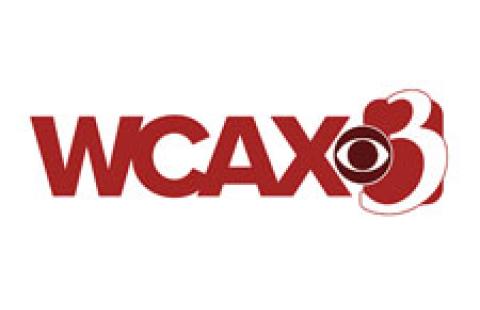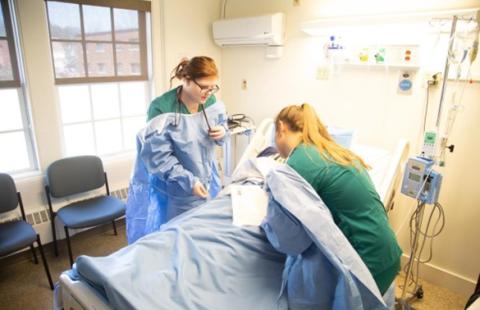A supportive learning environment for nursing students in the classroom,
clinical arena, and the greater community.
The Department of Nursing’s mission is to provide nursing curricula that supports excellence in nursing education. We educate future nursing leaders to provide innovative, high quality, accessible health care to the geographic regions of Plymouth and beyond. With a 100% NCLEX pass rate and recognition as the #1 Nursing Program in New Hampshire by registerednursing.org, we teach practices that promote the health and well-being of diverse individuals, families, communities, populations, and systems. We graduate competent nurses who make sound clinical judgments, communicate effectively, and make decisions using the best evidence available, to practice in an interdisciplinary global healthcare environment.
Our vision is to prepare nurses to deliver patient-centered care as members of an interdisciplinary team, emphasizing teamwork and collaboration, safety, evidence-based practice, quality improvement, and informatics.
Program Goals
Based on the Mission, Vision, and Philosophy of the Department of Nursing, the following program goals have been identified. The program goals of the nursing program are to:
- Prepare graduates to provide safe, evidence-based, patient-centered care that reflects ethical clinical judgement and inter-professional collaboration.
- Provide an innovative program of study that is responsive to the changes in the healthcare environment.
- Promote collaboration and partnerships within the communities of New Hampshire and the world beyond.
- Develop students’ critical thinking skills, to solve problems encountered on the work unit, considering the health care system’s technological resources, agency policies, and client/family needs, to deliver quality care.
- Promote effective communication across all nursing practice settings, considering psychosocial, physiological, developmental, spiritual, cultural and educational concerns, in order to support positive client outcomes.
Program Philosophy
The Nursing Program derives its philosophy from the mission statement of Plymouth State University Ut Prosim: That I May Serve. The Department of Nursing embraces innovative and creative approaches to interdisciplinary, culturally-sensitive nursing practice. The faculty believe the purpose of a collegiate undergraduate education is to prepare the professional nurse whose practice is informed by theory and research to positively impact communities. The philosophy is further rooted in the competencies defined by the Nurse of the Future literature (MA Dept. of Higher Education, 2010) and the American Association of Colleges of Nursing (AACN) Essentials of Baccalaureate Education.
Educational Philosophy
The PSU Nursing Department provides a supportive learning environment for nursing students in the classroom, clinical arena, and the greater community. The pursuit of a career in the profession of nursing implies a spirit of life-long learning; in that vein, the Nursing Department seeks to partner with students to create a mutual teaching and learning continuum wherein we all learn from each other. This spirit of inquiry is encouraged through discovery of the arts and sciences of nursing, using a problem-solving approach, whereby students and faculty alike find meaning in their nursing practice, within a framework of mutual respect. The essence of nursing lies in service to people in need; the PSU motto embraces this spirit of service to our community.
Allied Health Sciences Pre-Nursing Option
Plymouth State’s Allied Health Sciences Pre-Nursing Option is a great pathway for applicants lacking appropriate grades for acceptance in PSU’s highly competitive nursing major. Pre-nursing students who complete and earn a minimum of B- in all prerequisite courses will automatically move into the nursing program entering their sophomore year. Alternatively, students can choose from three additional options as an allied health science major: pre-athletic training; pre-professional; or healthcare administration.
RN to BS in Nursing Option
This new option enables working nurses to earn their bachelor of science in nursing (BSN) degree. Prospective students who already have an associate degree and are licensed as registered nurses (RN) in any state can transfer between 60 to 90 credits toward the 120 total credits required to graduate at PSU.
While nursing classes will be held in-person at the PSU campus, there is also an option to attend remotely via Zoom, which will provide flexibility for working nurses and out-of-state students. Certain general education courses are also available as online courses.
Requirements are listed below in CURRICULUM & REQUIREMENTS (click on Requirements for the Program, then cursor down to the RN-BSN BS in Nursing Option). “RN to BSN Program Launched” has additional information.
From the Director
Welcome! You have made an excellent decision to join a profession that provides tremendous opportunities. As a nurse, you are choosing to spend your life helping others by using skills that blend scientific knowledge with compassion and caring. There are few professions that offer such a rewarding combination of high tech and high touch.
The nursing faculty at Plymouth State University is committed to educating and preparing future nursing leaders for practice and service to meet the growing health care demands of the community and the world.
On behalf of the nursing faculty and staff, I wish you success as you pursue your nursing education. If you have any questions about the program, please don’t hesitate to contact me. I look forward to meeting you.
Dr. Donna Driscoll, DNP, RN, CEN
Office Location: Samuel Read Hall Rm 313
Office Phone: (603) 535-2120
Mail Stop: MSC 58
E-mail: dldriscoll@plymouth.edu
Curriculum & Requirements
| Course | Title | Credits |
|---|---|---|
| Major Requirements | ||
| BI 2110 & BI 2130 | Human Anatomy and Physiology I and Human Anatomy and Physiology Laboratory I | 4 |
| BI 2120 & BI 2140 | Human Anatomy and Physiology II and Human Anatomy and Physiology Laboratory II | 4 |
| BI 2340 | Microbiology for Nurses | 4 |
| MA 2300 | Statistics I (QRCO) | 3 |
| PS 2015 | Introduction to General Psychology | 4 |
| PS 2055 | Life-Span Developmental Psychology | 4 |
| NR 2100 | Foundations of Professional Nursing | 3 |
| NR 2550 | Health Assessment | 3 |
| NR 2750 | Pathophysiology | 4 |
| NR 3020 | Introduction to Patient-Centered Care (DICO) | 3 |
| NR 3035 | Nursing Care of Children | 2 |
| NR 3052 | Clinical Applications of Patient-Centered Care | 4 |
| NR 3070 | Health and Wellness of Older Adults (WECO) | 3 |
| NR 3095 | Evidence-Based Practice in Psychiatric Mental Health Nursing | 2 |
| NR 3135 | Clinical Applications of Pediatric Wellness and Illness | 1 |
| NR 3150 | Pharmacology | 4 |
| NR 3550 | Clinical Application of Health and Wellness for the Older Adult and Chronic Illnesses | 2 |
| NR 3700 | Clinical Evidence-Based Practice in Psychiatric Mental Health Nursing | 1 |
| NR 4000 | Evidence-Based Practice in Medical Surgical Nursing | 4 |
| NR 4015 | Maternal and Newborn Care | 2 |
| NR 4020 | Global Health and Population-Based Health Care (GACO) | 3 |
| NR 4060 | Research Process and Evidence-Based Practice (QRCO,WRCO) | 3 |
| NR 4100 | Clinical Evidence-Based Practice in Medical Surgical Nursing | 3 |
| NR 4150 | Clinical Application Maternal Newborn Care | 1 |
| NR 4500 | Nursing Leadership for Acute Care Nursing (INCO) | 3 |
| NR 4600 | Leadership, Collaboration & Quality Health Care Systems (TECO) | 3 |
| General Education | ||
| EN 1400 | Composition | 4 |
| IS 1115 | Tackling a Wicked Problem | 4 |
| CTDI | Creative Thought Direction | 3-4 |
| PPDI | Past and Present Direction | 3-4 |
| SSDI | Self and Society Direction | 3-4 |
| Directions (choose from CTDI, PPDI, SSDI) 1 | 4-8 | |
| IS 4220 | Signature Project (INCO,INCP) | 4 |
| Electives | 0-8 | |
| Choose either Pre-licensure or RN-BSN Option | 13-15 | |
| Total Credits | 120 | |
- 1
Directions should total 16-17 credits because SIDI is waived for BS Nursing.
Pre-licensure BS in Nursing Option
This option is designed for those seeking to earn a BSN and be eligible to take the NCLEX-RN upon successful completion of the program. Pre-licensure students must earn a minimum grade of B- in all prerequisite courses. Students must earn a grade of a B- (minimum numeric score of 80) or higher in all nursing (NR) theory courses and a pass in all nursing (NR) clinical courses in order to progress in the program. Students must earn and maintain a minimum grade point average of 2.67 (B-) in both the major and the cumulative GPA in order to progress in the program.
| Course | Title | Credits |
|---|---|---|
| NR 2300 | Biochemistry for Nurses | 3 |
| NR 3077 | Clinical Applications of Community Based Care | 1 |
| NR 4082 | Leadership and Quality Improvement in Clinical Settings | 6 |
| NR 4310 | NCLEX-RN Success 1 | 1 |
| NR 4360 | NCLEX-RN Success II | 2 |
| Total Credits | 13 | |
RN-BSN BS in Nursing Option
Students with an earned Associate Degree in Nursing and licensure as an Registered Nurse may apply to PSU to earn a BS in Nursing. Once admitted, students must earn a grade of a B- (minimum numeric score of 80) or higher in all nursing (NR) theory courses and a pass in the nursing (NR) clinical course to progress in the program. Students must earn and maintain a minimum grade point average of 2.67 (B-) in both the major and the cumulative GPA to progress in the program.
| Course | Title | Credits |
|---|---|---|
| PBH 2000 | Foundations of Public Health | 4 |
| Business Course (Choose one course): | 3-4 | |
BU 2240 | Business Statistics (QRCO) | |
BUS 1200 | Business Law and Ethics (DICO) | |
BUS 1300 | Digital Information Technologies (TECO) | |
BUS 1400 | Principles of Economics (GACO) | |
BUS 2000 | Financial & Managerial Accounting | |
| Social Issues Course (Choose one course): | 3-4 | |
AN 3605 | Forensic Anthropology | |
ESP 3550 | Environment and Health (WECO) | |
HE 3700 | Drug Behavior (WECO) | |
HE 4100 | Women's Health Issues (WECO) | |
PO 3255 | Model United Nations (GACO,INCO) | |
PY 3325 | Medical Ethics (INCO,WECO) | |
SW 3500 | Health and Society (GACO,WECO) | |
| NR 4083 | Clinical Applications of Leadership | 3 |
| Total Credits | 13-15 | |
Check all course descriptions for prerequisites before planning course schedule. Course sequence is suggested but not required.
To complete the bachelor’s degree in 4 years, you must successfully complete a minimum of 15 credits each semester or have a plan to make up credits over the course of the 4 years. For example, if you take 14 credits one semester, you need to take 16 credits in another semester. Credits completed must count toward your program requirements (major, option, minor, certificate, general education or free electives).
| Year One | ||
|---|---|---|
| Fall | Credits | |
| BI 2110 | Human Anatomy and Physiology I | 3 |
| BI 2130 | Human Anatomy and Physiology Laboratory I | 1 |
| IS 1115 | Tackling a Wicked Problem | 4 |
| PS 2015 | Introduction to General Psychology | 4 |
| Directions (choose from CTDI, PPDI, SSDI) | 3-4 | |
| Directions (choose from CTDI, PPDI, SSDI) | 3-4 | |
| Credits | 18-20 | |
| Spring | ||
| BI 2120 | Human Anatomy and Physiology II | 3 |
| BI 2140 | Human Anatomy and Physiology Laboratory II | 1 |
| MA 2300 | Statistics I (QRCO) | 3 |
| EN 1400 | Composition | 4 |
| Directions (choose from CTDI, PPDI, SSDI) | 3-4 | |
| Credits | 14-15 | |
| Year Two | ||
| Fall | ||
| PS 2055 | Life-Span Developmental Psychology | 4 |
| NR 2100 | Foundations of Professional Nursing | 3 |
| NR 2300 | Biochemistry for Nurses | 3 |
| Directions (choose from CTDI, PPDI, SSDI) | 3-4 | |
| Credits | 13-14 | |
| Spring | ||
| BI 2340 | Microbiology for Nurses | 4 |
| NR 2750 | Pathophysiology | 4 |
| NR 2550 | Health Assessment | 3 |
| Elective | 3 | |
| Credits | 14 | |
| Year Three | ||
| Fall | ||
| NR 3020 | Introduction to Patient-Centered Care (DICO) | 3 |
| NR 3150 | Pharmacology | 4 |
| NR 3052 | Clinical Applications of Patient-Centered Care | 4 |
| NR 3095 | Evidence-Based Practice in Psychiatric Mental Health Nursing | 2 |
| NR 3700 | Clinical Evidence-Based Practice in Psychiatric Mental Health Nursing | 1 |
| Credits | 14 | |
| Spring | ||
| NR 3035 | Nursing Care of Children | 2 |
| NR 3135 | Clinical Applications of Pediatric Wellness and Illness | 1 |
| NR 3077 | Clinical Applications of Community Based Care | 1 |
| NR 4020 | Global Health and Population-Based Health Care (GACO) | 3 |
| NR 3070 | Health and Wellness of Older Adults (WECO) | 3 |
| NR 3550 | Clinical Application of Health and Wellness for the Older Adult and Chronic Illnesses | 2 |
| NR 4600 | Leadership, Collaboration & Quality Health Care Systems (TECO) | 3 |
| Elective or INCP | 3 | |
| Credits | 18 | |
| Year Four | ||
| Fall | ||
| NR 4000 | Evidence-Based Practice in Medical Surgical Nursing | 4 |
| NR 4015 | Maternal and Newborn Care | 2 |
| NR 4100 | Clinical Evidence-Based Practice in Medical Surgical Nursing | 3 |
| NR 4150 | Clinical Application Maternal Newborn Care | 1 |
| NR 4310 | NCLEX-RN Success 1 | 1 |
| Elective | 3 | |
| Credits | 14 | |
| Spring | ||
| NR 4500 | Nursing Leadership for Acute Care Nursing (INCO) | 3 |
| NR 4060 | Research Process and Evidence-Based Practice (QRCO,WRCO) | 3 |
| NR 4360 | NCLEX-RN Success II | 2 |
| NR 4082 | Leadership and Quality Improvement in Clinical Settings | 6 |
| Credits | 14 | |
| Total Credits | 120 | |
- Demonstrate accountability for practicing nursing within established moral, legal, ethical, regulatory, and humanistic principles.
- Demonstrate an awareness of and responsiveness to the larger context and system of health care and the ability to effectively call on system resources to provide care that is of optimal quality and value.
- Use information and technology to communicate, manage knowledge, mitigate error, and support decision-making.
- Identify, evaluate, and use the best current evidence coupled with clinical expertise and consideration of patients’ preferences, experience and values to make practice decisions.
- Function effectively within nursing and interdisciplinary teams, fostering open communication, mutual respect, shared decision making, team learning, and development.
- Minimize risk of harm to patients and providers through both individual performance and system effectiveness.
- Use data to monitor outcomes and care processes and use improvement methods to design and test changes to continuously improve the quality and safety of health care.
- Influence the behavior of individuals or groups of individuals within their environment in a way that will facilitate the establishment and acquisition/achievement of shared goals.
- Deliver holistic nursing care and advocate for health promotion and disease prevention strategies at the individual, family, community, and global levels.
- Demonstrate effective communication skills with clients that foster mutual respect and shared decision making to enhance patient satisfaction and health outcomes.
- Microbiology
- Nutrition
- Human anatomy & physiology
- Chemistry
- Statistics
- Variety of clinical experiences in different healthcare settings
- Nursing care of women & children
- Nursing care of the adults & elderly
- Mental health nursing
- Community and Public Health
BS graduates may go on to have successful careers in specialized fields such as:
- Emergency room care
- Home healthcare
- Mental health
- Critical care
- Oncology
- Geriatrics
- Pediatrics
- Obstetrics
- International healthcare settings
- Military healthcare
Explore Program Details
Approval
Office of Professional Licensure and Certification
7 Eagle Square
Concord, NH 03301
The baccalaureate degree program in nursing at Plymouth State University has been granted Full Approval Status by the New Hampshire Board of Nursing.
Accreditation
The baccalaureate degree program in nursing at Plymouth State University is accredited by the Commission on Collegiate Nursing Education.
Commission on Collegiate Nursing Education
655 K Street, NW, Suite 750
Washington, DC 20001
P: (202) 887-6791
F: (202) 887-8476
For questions about the approval and accreditation of the Nursing Program please contact: Donna Driscoll, DNP, RN, CEN, Director of Nursing Program, (603) 535-2120.
Transfer Student Requirements
Currently, each nursing cohort is limited; therefore, very few openings are expected yearly. Students requesting transfer into the program may apply to the nursing department following the guidelines outlined on the page linked below.
Program Fees – 2023/2024 Academic Year
The Nursing Program fee is assessed each semester a student is enrolled in the Nursing Program. The Program Fee replaces the Course Fees that were previously attached to the nursing courses. The Program Fee covers a multitude of goods and services previously billed directly to the student. The Program Fee structure provides the student the opportunity to spread the cost of the required program components over multiple years and take advantage of financial aid.
The fee for the current academic year per semester is $550.00 and covers the following required goods and services:
- ATI Complete (Assessment Technology Institute) Books and Programs: The products are used in the nursing courses and also to prepare for the NCLEX examination.
- Complio: An online platform to manage background checks, drug screening and health clearances necessary to attend clinical.
- Typhon: A nursing school information management platform that stores clinical hour logs, resumes, clinical placement information and more.
- Student Nurse Uniform: One scrub top, one pair of pants, and one name badge from Uniformly Yours, Laconia, NH.
- Simulation Lab Fee
IDEA Ambassador Spotlight
Shandiin Clark ’25
Shandiin Clark, a nursing major, began working with the Inclusion, Diversity, Equity, and Access (IDEA) Center because she wanted to “bring more recognition to the Native American and Indigenous community.” She also believed this position would give her an opportunity to learn more about other cultures and their traditions. To her, diversity means appreciating and accepting other people’s cultures and values without being judgmental.
When not at work or studying, you can find Shandiin in her free time listening to music, reading, drawing, playing basketball, and hanging out with friends. The best part about being a social justice leader to her would be learning about the new cultures through programs that the center hosts, such as Empower Hours. “Being a SJL has given me more opportunities, whether it be within my educational career or not.”
If given the chance to be in a movie, you would find Shandiin in Percy Jackson & the Olympians.
Shandiin Clark ’25: Belonging on Campus
IDEA Ambassadors work hard to advance inclusion, diversity, equity, and access across our campus and beyond.
Visit the Inclusion, Diversity, Equity, and aCCESS site for more information

Explore Today.
Realize Tomorrow.









